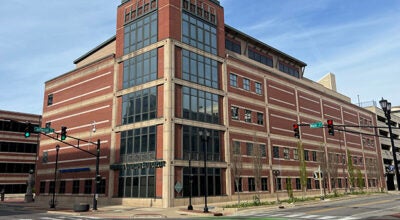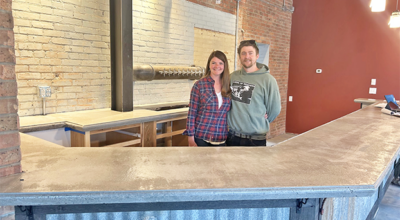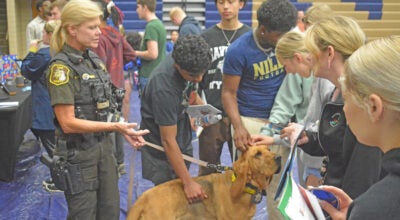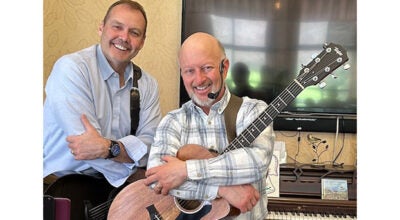Glassman’s gift for gab
Published 9:38 pm Monday, February 27, 2012
EAU CLAIRE — After 61 years as a fast-talking auctioneer, John M. Glassman’s gift of gab has carried him far beyond attending the Reppert school in Decatur (now Auburn), Ind., with entertainer Leroy Van Dyke, being the top Hoover vacuum salesman in Michigan, several years as president of the Michigan Auctioneers Association and an appearance on Herb Shriner’s show in New York, for which he rented a Cadillac.
Even if the raconteur never shakes his father’s withering assessment of his attributes, Glassman, 84, can’t imagine retiring, though he leaves technology tussles to his sons, Jerry and John.
“When I was in school, I was so bashful I couldn’t say a silent prayer,” Glassman said Dec. 28.
Without the clipped cadence (and polka music), “It would be boring.”
From their spread on Main Street in this Berrien County community where he grows the apples he’s always giving away, Glassman built what today is known as Glassman-Smittendorf Auctioneers and Real Estate, with an office also in Battle Creek.
The firm employs seven auctioneers who carry out some 100 sales a year in southern Michigan and Indiana, though items have also been shipped as far as Poland and England thanks to the global reach of internet websites and Facebook.
Though he’s been around farming all his life, losing 500 cherry trees in a freeze at his Cass County farm near Wicks’ Apple House between Indian Lake and Sister Lakes persuaded him a higher power had other plans in store.
He slips easily from one story to another while sipping Rush Limbaugh’s raspberry Two if by Tea.
Grandson Michael, hunched over a laptop, studies at Southwestern Michigan College for teaching while tutoring at a Dowagiac elementary school.
Daughter Cindy Glassman-Cantrell, a personal property appraiser who lives on Brush Lake Road, evacuates the office lined with enough books for a law library as he launches into well-worn yarns she can probably recite in her sleep.
Glassmans moved to Eau Claire when Cindy was in first grade.
Glassman is recounting the time he invited Van Dyke to the Berrien County Youth Fair and “he come in a $255,000 computerized bus. I told him, ‘Leroy, you’ve got the whole herd, and I don’t have a cow yet.’ ”
Van Dyke’s autographed glossy is framed in a montage that acknowledges Leroy meeting President Reagan and opening for Marilyn Monroe.
In 1950, Glassman paid $300 for three-week auction school “and I only learned three things. One, strike out the word ‘give’ in the dictionary and put in ‘sell.’ Two other things, ‘That ain’t enough’ and ‘I want more.’ My father-in-law said, ’John, the way you shoot the bull around here, you ought to be an auctioneer.’ ”
“If you go down here to Harding’s Market and take a left,” Glassman shifts gears, “at the top of the hill where Prillwitz’s is, my dad built that house the year I was born. I had one brother who died in 1919, then they had four girls, so when he got a son he built a house. My dad told me 70 years ago, ‘Sonny, you’re never going to amount to nothing. You never want to work, just talk.’ It took 60 years to prove him right.”
Sales skills honed
on Hoover vacuums
“I didn’t need a whole lot of schooling. School was holding me back. When I was a junior, I was the top Hoover vacuum cleaner salesman in Michigan. They brought me to the Pantland Hotel (in Grand Rapids) and put on a big show.”
He wouldn’t divulge the secrets of his sales success then, but “Dowagiac, Berrien Springs, Niles, St. Joseph, Watervliet and Coloma all had theaters. I ran an ad in every one of them saying Glassman will clean your house for free. Call this number. I never went to a house, knocked on the door and asked them to buy a cleaner. We had an $89.95 and a $69.95 and a I sold more (of the cheaper model, which was an inch narrower).”
If that ingenuity seems in conflict with his dad’s assessment, consider peaches.
“When I was going to school, you couldn’t sell ripe peaches in this area because we all had them,” Glassman said. “The Fruit Exchange was dumping them. I came by on my bike one day and offered them a dollar a bushel and picked them up every Tuesday and Thursday. I took my dad’s truck and his gas and took them down in the Amish country to Shipshewana and Wakarusa and sold them for $3.50 to $4 a bushel just as fast as you could get rid of 60 bushels. I didn’t need a lot of education to know if I bought for a dollar and sold for $3.50 to $4 … I didn’t want to read history, I wanted to make history.”
Glassman’s unschooled, very German father perhaps mistook the licensed real estate broker’s poor fit to farming for laziness.
“God gave me this other talent,” he said. “When God gives you a talent, zero in on it. He loved me, but I never satisfied my father. If I packed six bushels of peaches an hour, he wanted seven tomorrow. I had to rescind my prayer when I left home. I asked the Lord for a good wife, one son and 40 acres, bought and paid for. God looked down and said, ‘John, you don’t see the whole picture.’ I’d be nothing if it hadn’t have been for her,” his wife, LaVerne, who dutifully transcribed inventory recordings he made because only he could read his handwriting.
What Glassman got was two sons, three daughters and 100 acres.
“I said, ‘Lord, no more land. Taxes are getting too high.’ My brother-in-law rents the farm and, with the tractors he’s got, he’s got it tilled, rolled and planted in one day. I like the rural setting. Thursday I had 400 people at my sale in New Buffalo, in South Haven Friday we had 500 and 600 the third day,” so he gets plenty of socializing without hanging out at a coffee shop.
Technology felt
in auctioneering
Technology moved the markers for a sale from a radius of 30 miles to “the other day we sold a truck in Rudyard in the UP,” Glassman said. “I used to have to go to Dowagiac and Marcellus and deliver” sale notices, with apples and boxes of chocolates at Christmas. “These boys come at 9 o’clock Monday morning and jump on the computer, Farmers Exchange down in Indiana, Kalamazoo Gazette, Grand Rapids Press, wherever we need to go, and they’ve got it done by 11 and are out to get some lunch.”
Of course, in the ’50s, a farm sale could be sealed with a handshake. Contracts came later. So did the fax machine and printer which folds brochures.
“I didn’t need all that,” the patriarch said. “But if I made a $150 commission, I brought home $147. These guys could spend $6,000 making a $5,000 commission. My wife says I can never retire because I never worked. I was a disappointment to my father because he wanted me to farm. When God said, ‘I’m giving out brains,’ I thought He said, ’trains,’ and I missed it,” which is similar to an anecdote about confusing a doctor’s prescription for a heart murmur with “hot mamas.”
Glassman detoured in Kentucky to take in a sale while traveling to Florida. It gave him the idea to offer selections “so you can buy what you want and be on your way. People today have no patience,” he said. “A guy over here in Hartford spent $87,000 with us in 15 minutes” by knowing tractors would be sold at noon. “He had 100 acres of potatoes to dig in Florida and didn’t have the equipment. The boys have taken it even farther — 11, guns; 12, furniture; 1, real estate. That’s what people want today, and away they go.”
Auctions remain popular because “they get it done. People want bargains,” he said. “You have a yard sale, it takes three days and half of it’s left over unless you knock (prices) down to where you don’t get anything.
“An estate in Dowagiac, a lady from Kalamazoo offered $8,500 for a chest of drawers,” which bidding brought to a Grand Rapids man who paid $21,000. “Some things you give away, but others you’ll get twice what you thought. My most memorable sale was the next one. I’ve never had a small sale. For a little lady going into a rest home, $2,000 is a big sale for her. We had a sale over here in Lawrence where I sold a farm for $1 million and $187,000 for tractors and tools. That was a big sale for him.”
Poking fun at his own aging, Glassman tells about a guy who had trouble hearing and underwent surgery. A few months later the doctor runs into him downtown and wonders if his family is pleased by his hearing restoration.
“I didn’t tell them anything,” comes the punchline. “But I sat and listened and changed my will three different times.”
He had a hard time breaking into the business because when he got out of auctioneering school a chief competitor, Oscar Burch, had been Cass County sheriff.
“They had all the business sewed up. I had to fight. What helped me as much as anything was people around here knowing my father” and his sterling reputation for honesty. If he received a dime more than he was entitled, “He’d jump in his Chrysler car and drive back with that 10 cents. I don’t think he ever signed a note to borrow money from the bank. People said, ‘His dad was honest, maybe he’ll be honest.’ I’ve got two problems. I want to go to heaven, but I don’t want to die.”







